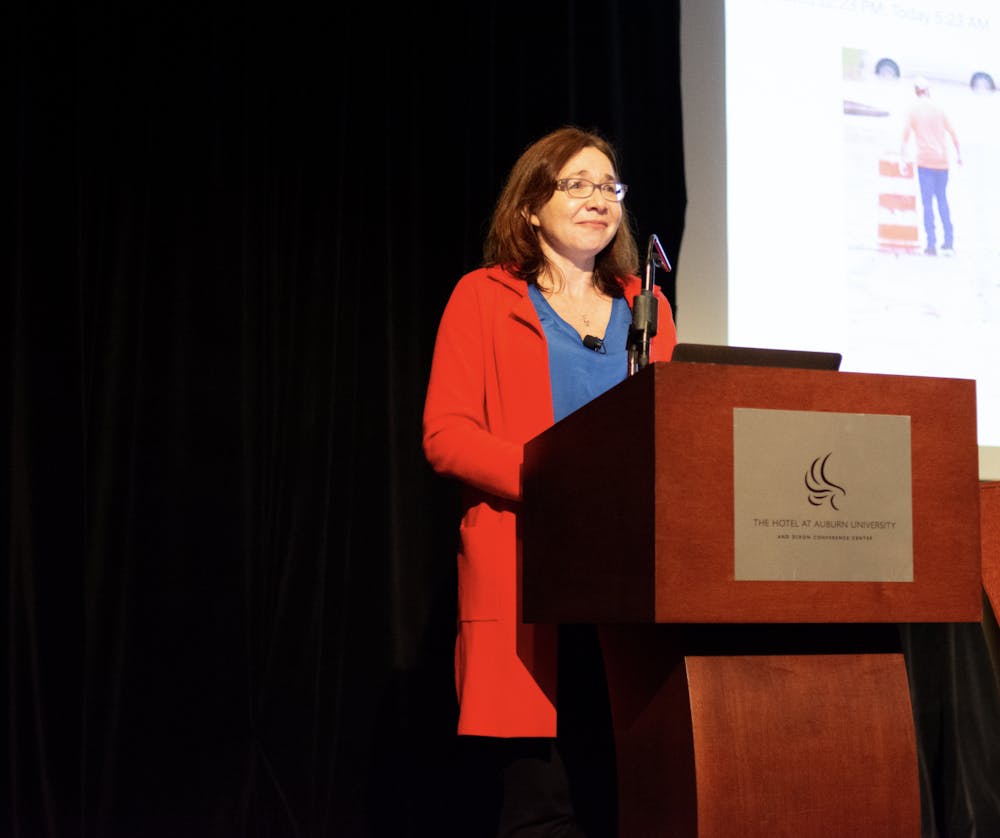For many Americans, religion and science are thought to be pitted against each other in a cultural war of attrition, as courts have battled for decades over where to draw the line in the sand of what is acceptable for public education and what isn’t.
For Katharine Hayhoe, an evangelical Christian and world-renowned climate scientist, such a juxtaposition doesn’t exist. Her father was a missionary and a science educator, so she grew up seeing them as intrinsically intertwined.
“I grew up with the idea that if you believe that the same God who wrote the Bible is the same God who made the universe, which most people believe if they believe the Bible, then how could anything you learn about the universe contradict the Bible if they are written by the same person?” she said in a sit-down interview with The Plainsman.
Hayhoe spoke to Auburn students about the intersection between faith and science on Feb. 6, 2020, at The Hotel at Auburn University. Hayhoe was named a 2019 United Nations Champion of the Earth.
Climate change is often framed as a religion, she said. An earth-worshipping religion, a pagan religion, a religion that you believe in instead of God.
“When most of us have a belief that we are okay with … we are not looking for a new one,” Hayhoe said. “So framing climate change as a religion is a way to actually get a lot of people to reject it.”
The science, however, is clear that the climate is changing, she said; even when deniers try to call it a religion. The evidence is abundant, even with just things we can personally observe.
“So if it really is a conspiracy, somehow that conspiracy is not only faking temperature data going back to the 1600s, it is also somehow forcing every tree to bloom earlier,” she said. “It’s forcing glaciers to somehow melt. It’s forcing animals to somehow move.”
Most objections to the science behind climate change declare that humans aren’t at fault. Some people say it’s just a natural cycle, or the sun’s energy is becoming stronger or blame orbital cycles and volcanoes.
These things can affect the climate in various ways, but they don’t explain the current issue we are facing, Hayhoe said. The root cause of the warming that has increased the global temperature since the Industrial Revolution is clear: The burning of fossil fuels like coal, oil and natural gas, and the impacts are serious.
Hayhoe is a lead author of the Fourth National Climate Assessment, which assesses the science and impacts of climate change in the United States.
According to Hayhoe, Alabama has already seen increased heavy rainfall, more heatwaves, less cold waves and warmer nights due to the impacts of climate change. Sea level rise is not only increasing, it’s accelerating along U.S. coastlines.
Hurricanes are becoming more dangerous as ocean temperature rises. They are stronger, bigger and slower.
Hayhoe said it is estimated that almost 40% of the rain that fell during Hurricane Harvey would not have fallen if the same hurricane had happened a hundred years ago.
“The bottom line is this: Climate change is loading the weather dice against us,” Hayhoe said. “We always have a chance of rolling a double six … but as the planet warms, decade by decade, it is like it’s sneaking in and taking that three and replacing it with another six.”
When the evidence is immediately visible and overwhelming, what reason do climate change deniers have to deny the science?
Hayhoe said the reasons for climate change denial have nothing to do with theology and everything to do with political ideology.
“We have rewritten our statement of faith so that it reads more like the position statement of a political party than something that comes from the Bible,” she said. “Basically, there’s nothing inherently unchristian about saying the climate is changing and humans are responsible.”
That doesn’t stop many Christians from wondering what the Bible has to say about climate change. In her Global Weirding YouTube series, her most-watched video discusses what the Bible says about climate change.
In Genesis 1, God created man and gave him dominion over the earth. A responsibility to care for it.
“If you believe what the Bible says, you would believe that we do have the ability to affect the planet,” Hayhoe said.
Even still, she gets hate mail.
When she first started talking with others about her faith and her belief in climate change, Hayhoe was nervous the scientific community would be unwelcoming. They might ask her if she “checked her brain at the door.”
However, she found many of her colleagues to be religious themselves or supportive of her religious views. She didn’t expect Christians to react with such hostility.
“The amount of hate mail I get from Christians is shocking,” Hayhoe said.
She estimated that 200 Christians sent her hate mail — connecting climate action with one-world government or the antichrist — for every scientist that said her faith conflicts with her career.
Hayhoe believes the connection made by her critics between policy and paganism is the epicenter of climate denial.
People don’t want to care about issues that conflict with their personal identity and beliefs.
On Tangier Island, rising sea levels swallow more and more of the island every year.
Hayhoe said the people living there are conservative and don’t believe in climate change. When asked why they think their home is shrinking, their answer, over and over again, is erosion.
When people think the only solution to climate change is something horrible, the natural defense mechanism is to reject the reality of the problem, Hayhoe said. It’s a solution aversion.
If someone were to accept the reality that climate change will disproportionately impact the most vulnerable people, but didn’t want to fix the problem, they would be a bad person, Hayhoe said. Since no one wants to be a bad person, the psychological reaction is to deny the problem.
“People can be reached by showing how they already care, they just didn’t realize it,” Hayhoe said. “So often we feel like we have to be a different person, like we have to turn into an environmentalist or turn into a liberal or we have to turn into something to care, but if you show people that who they already are is the perfect person to care, that’s how we can connect the dots. Nobody really wants to be somebody different. We are usually pretty okay with who we are.”
Hayhoe said when hunters understand that climate change affects the populations of the animals they hunt, they care about climate change.
“Connect the dots right to what they care about, rather than trying to make them care about what you care about,” she said.
One of Hayhoe’s colleagues is a cognitive psychologist who created a website that factually responds to climate-change-denying arguments. It wasn’t enough for his own father, though.
But then, the rural area where his father lived had a rebate on solar panels.
His father’s identity was a shrewd, fiscal conservative who saved money and made smart business decisions.
So he crunched the numbers. He saw how much money he would save. Then he bought the solar panels.
“He got so excited about all the money he was saving that he would email his son every month when the bill arrived,” Hayhoe said.
He bragged to his son about how low his power bills were.
A year later, the two were having dinner.
The father told his son it was obvious the climate was changing and that everyone knew.
The son nearly fell out of his chair. It wasn’t his son or the research his son did that changed his mind, Hayhoe said.
It was the fact that he found a practical solution related to climate change.
“We always think that we have to be a certain type of person to care, but we don’t,” Hayhoe said. “All we have to be is a human. Every single one of us needs air to breathe and water to drink and food to eat and a safe place to live and materials to make everything that we use. All of that comes from this planet, so if the planet can’t supply that for us anymore, we are the ones who are going to suffer.”
Do you like this story? The Plainsman doesn't accept money from tuition or student fees, and we don't charge a subscription fee. But you can donate to support The Plainsman.

Trice Brown, sophomore in english language arts education, is the campus editor of The Auburn Plainsman.





